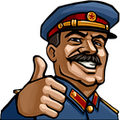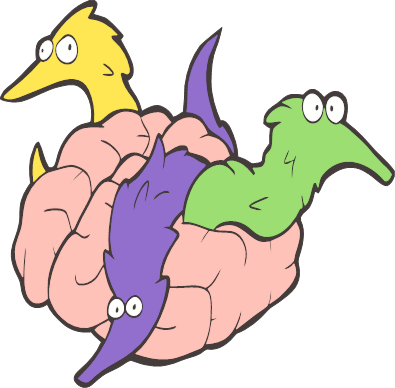I am as white as the day is long. I have never set foot outside of the south. I’m just starting Settlers rn and it is very insightful. It does, however, have me afraid of my own ignorance. I’m the only person from my neck of the woods that I would even call somewhat “progressive”, but still. I am aware I was raised in privilege and surrounded by hate. (I even attended a segregated school for many years as a child…) I’ve always been pretty proud of how far I’ve come, but I feel like I still probably have some things ingrained in me that need to be smashed up. Recommendations welcome for all kinds of topics. I like to read and learn from whatever is put in front of me.
Trans Liberation Beyond Pink and Blue is a hexbear favorite.
Fanon’s wretched of the earth is a real strong classic on the “third world”
Anything by web dubois and fred douglass is a good start for the origins of racism in the us. Anything by Dr. King, too.
Blood in my Eye is a good read, and pretty quick.
I will always tell every single human to read The Art of War at least once.
Thanks, comrade. Dubois to me is vastly underrated and I appreciate being recommended a favorite!
A lot of the recs in this thread cover events that resulted in imperial slaughter or triumph and left/anticolonial movements losing, so if you want a bloomer rec the book October by China Mieville is a gripping retelling of the February & October revolutions in Russia that overthrew the Tsar and then established a communist government. Gotta have a dream to work toward.
Thank you
I started this two days ago on your recommendation, and it’s great. I’ve read some of Mievelle’s fiction and enjoyed it, but was somehow unaware of this. Really enjoying it. Thanks, comrade.
Happy to hear!
IDK I’ll just recommend stuff I’ve read recently.
I’m definitely seconding Trans Liberation Beyond Pink and Blue. There’s an audiobook if you’re into that.
If We Burn was a really interesting retrospective about the protest movements of the 2010s and what they accomplished, and how they failed.
For history I recommend the John Brown biography by W. E. B. DuBois, as well as his other work Black Reconstruction. Also The Jakarta Method, which covers the ways the US instigated coups and genocides in Indonesia and Brazil (and elsewhere) by backing military dissatisfied with their progressive leaders.
Also, the Red Mars series for a purely fictional story. Has some decent sci-fi nerd shit, a cool revolution, and loads of characters.
Black Reconstruction is excellent. I do still need to read the Jakarta method tho so thank you for the reminder.
Just a heads up with Settlers, it’s a very good read and makes some very good arguments but it makes some scholarly errors. Don’t take everything it says about history as gospel. All respect for J. Sakai, he was not an academic but he was organising since he was a teenager. I recommend checking out some of the other stuff he wrote cause he has a lot of interesting perspectives.
I would say once you’re done with Settlers you wanna check out the stuff by the Black Panthers, a lot of whom were/are scholars. Angela Davis’ “Women, Race and Class” is one I specifically always recommend. That’s good for intersectionality and really good for where you’re coming from geographically speaking.
Others have recommended Fanon, I will also do so. I also highly recommend Walter Rodney a Guyanese scholar who wrote some very accessible works in the 70s, mostly talking about his home country as well as the wider Caribbean and a lot about Africa. Some of his stuff here
A more recent book I recommend is “Red Star over the Third World” by Vijay Prashad. He’s an Indian historian that’s still active and has written a lot of good books in English. You can find a lot of the talks and interviews he’s given on YouTube as well.
When I went to go find that last link I also found this depository of stuff) which has a lot of stuff I think that might interest you. Lots of Palestine stuff at the top and a lot more of the stuff you’re asking for as you scroll down.
This one is quite interesting it’s a book about the connections between the US black liberation movement and the Korean liberation movement, the internationalism practiced between the two groups who felt they were fighting the same enemy. Rest of the stuff on that site is really good as well.
Last thing I’ll recommend is this book by a small, defunct British communist party on Trans issues from a left-wing perspective. It’s mostly focused on debunking a lot of the classic transphobic arguments, including the ones you hear that are “rational” or “scientific”.
Thank you
Frank recommended some great stuff!

If you still find yourself with US mythology
 Zinn’s A People’s History and Loewen’s Lies my Teacher Told Me are a must. Keeping in mind they both at some level have anti-commie brainworms.
Zinn’s A People’s History and Loewen’s Lies my Teacher Told Me are a must. Keeping in mind they both at some level have anti-commie brainworms.Continuing US history, Horne’s Counter-revolution of 1776, Beard’s Economic Interpretation of the US Constitution, and Davis’s Women, Race, and Class. Should pretty much cement that most of what you were taught about US history and the revolution is bullshit.
Then you can get into foreign policy with Blackshirts and Reds, The Jakarta Method, Washington Bullets, Blowback Podcast.
If you want a primer on Neoliberalism and how it’s taken over Frank’s Listen Liberal, Mayer’s Dark Money, and MacClean’s Democracy in Chains has you covered by examining neoliberalism’s rise in US political parties and media capture.
These are my key recommendations that helped me clean my brain out, excluding Feinberg and Fanon that Frank covered. Pick and choose as necessary, but the groups I have them in tend to compliment each other real well.
Oh, and it’s fiction, but as a straight white guy myself I definitely recommend Manhunt by Gretchen Felker-Martin. It’s about Trans-people fighting against Terfs in a post-apocalyptic wasteland. Some of the internal dialogue is heartbreaking but important to read, imo.
Black shirts and reds (along with yellow parenti) is what got me started
didn’t A People’s History kinda whitewash Bacon’s Rebellion or am I misremembering how it was presented?
Entirely possible, Bacon’s Rebellion is still something I need to read more about. Just looking over the pages dedicated to it in a People’s History, Zinn largely seems to posit that Bacon was pushing for more conflict with Native Americans to grow his wealth while the people that followed him (which included the enslaved and servants) were seeking to level the inequality. My own understanding from what little reading I’ve done including Counter-Revolution of 1776 is that what made it a big historical turning point is the alliance between enslaved PoC and poor whites scared the rich so much that it massively popularized the adoption of Freedom of Religion as a major ethos in order to become a selling point to whites back in the UK. Specifically Scots around that time period, iirc. Essentially birthing the idea of whiteness by uniting Europeans of differing religious backgrounds.
Thank you
Welcome









